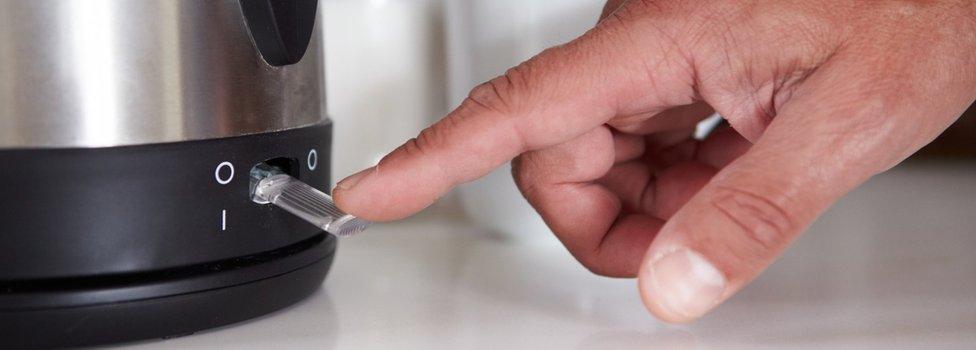General Election 2017: Energy bill cap 'will hit consumers'
- Published
- comments

Plans by the Conservative Party for a cap on household energy bills will lead to fewer benefits for consumers, says one of the UK's biggest providers.
A cabinet minister said the Tories planned to intervene in the energy sector "to make markets work better".
But Scottish Power, one of the "Big Six" energy firms, told the BBC that the move would "stop competition" and "damage customers in the long run".
Shares in energy firms were hit by the proposed price cap.
British Gas owner Centrica closed down 3.5% and SSE fell 1.9%, although both stocks had been lower earlier in the day.
The energy industry has reacted with scepticism to the plan, saying it could lead to higher prices.
Labour said the proposal should be taken with "a pinch of salt", adding that energy bills had "soared" under a Conservative government.
Speaking to the BBC, Scottish Power's chief corporate officer, Keith Anderson, said: "If you put a cap on prices, you actually stop competition. That's the danger of price intervention."
When companies do not compete as much, that tends to lead to fewer benefits for customers, he said.
He added that if the Conservatives did intervene, it would be better if they abolished standard variable tariffs.
About 800,000 of the poorest pensioners and 1.5 million low-income families with children are on standard variable tariffs, according to Citizens Advice.
These households are paying an average of £141 more a year for a dual fuel gas and electricity bill than if they were on the cheapest deal, it said.
'Not working'
Defence Secretary Sir Michael Fallon defended the Conservative's intention to impose a cap on energy prices.
"We wanted to see more competition, we wanted to see more people able to switch between energy users," Sir Michael told the BBC.
"That over the last three or four years has not happened. This is a market that is not working perfectly and therefore we are intervening to make markets work better," he added.
Co-leader of the Green Party Jonathan Bartley said the policy did not go far enough and he wanted more local choices of supplier for consumers.
But trade association body Energy UK said a cap could risk "billions in investment and jobs".
British Gas parent firm Centrica and fellow supplier E.On have both said market competition is essential.
Price comparison site uSwitch.com said that previous interventions in the energy sector had led to lower switching rates and higher prices.

How might an energy cap work?

By Brian Milligan, BBC personal finance reporter
If the Conservatives win the election, how might energy regulator Ofgem go about introducing a cap?
One model is already in place. Earlier this month, Ofgem put a limit on prices that households with pre-payment meters are charged.
Under this system, the Competition and Markets Authority has come up with an initial maximum figure for prices in each region of the UK, usually in line with the cheapest existing pre-payment meter tariff.
A second model - known as the relative price cap - would tell suppliers to have a maximum differential between their expensive standard variable tariffs and their cheaper fixed price deals.
For example, they might be told that their top tariff could only be a maximum of 10% more expensive than their cheapest deal.
Both price cap models are fundamentally different to the controls advocated by former Labour leader Ed Miliband in the run-up to the 2015 election.
He had proposed a price freeze for up to 19 months, although it would have allowed price reductions too. Under these two models, suppliers would also be free to reduce prices if they wanted to. However any cap could last for a much longer period.

- Published24 April 2017

- Published24 April 2017
- Published23 April 2017

- Published23 April 2017
